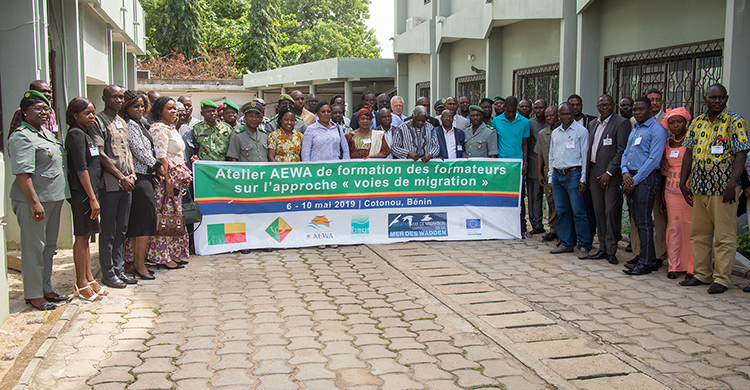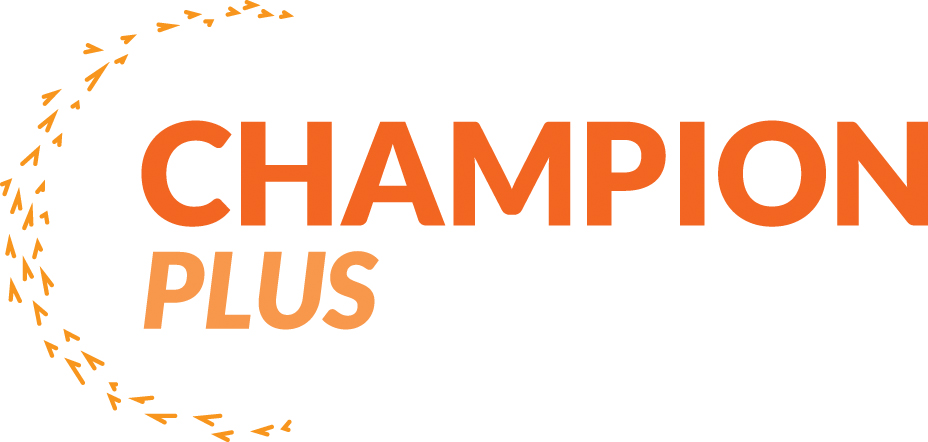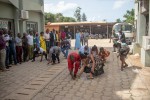Training of Trainers on Flyway Conservation

© Marie-Therese Kämper
Bonn, 21 June 2019 – An AEWA Training of Trainers (ToT) workshop on the flyway approach to the conservation and wise use of waterbirds and wetlands took place from 6 to 10 May 2019 in Benin. The workshop was jointly organized by the UNEP/AEWA Secretariat and the Directorate General of Water, Forests and Hunting (DGEFC) of Benin, in cooperation with the Ramsar Secretariat and the Wadden Sea Flyway Initiative (WSFI). It was made possible thanks to generous financial and in-kind support from the Government of Benin, the European Commission’s Global Public Goods and Challenges (GPGC) Thematic Programme Strategic Cooperation Agreement (SCA) with UN Environment, and the WSFI.
On behalf of the Minister, Jeanne Josette Acacha Akoha, Cabinet Director for the Minister of Environment and Sustainable Development, officially opened the workshop at the premises of the DGEFC in Cotonou. She gave a hearty welcome to all participants and emphasized the importance of putting into practice various concrete measures for promoting waterbird and wetlands conservation. The promotion of wetlands ecosystems conservation is taken into account in the Benin Government’s Action Programme (PAG 2016-2021) which contributes towards the implementation of the AEWA Strategic Plan and the Sustainable Development Goals.
The 44 trainees - technical experts from 18 Francophone countries of West and Central Africa, some representing regional wildlife training institutes - participated very actively and with great enthusiasm in the workshop which focused on enhancing their capacity and knowledge, equipping them with the necessary know-how to design and deliver future national training courses on the flyway approach to the conservation and wise use of waterbirds and wetlands.
Guided by the principal trainers for the workshop, Tim Dodman and Abdoulaye Ndiaye who are both co-authors of the Flyway Training Kit (FTK), and with support from Paul Ouedraogo (Ramsar Secretariat), Evelyn Moloko (UNEP/AEWA Secretariat) and Daouda Aliou (Department of Fisheries Production of Benin), participants were offered a rich programme consisting of lectures, practical exercises and games, group sessions, case studies, role play exercises and field excursions. The different components of the FTK, which was used as the main training tool, were explored in depth, including an overview of the flyway concept, reasons for and types of bird migration, monitoring of birds and their sites, conservation and management of birds and sites using the flyway approach, species action planning, capacity-building, awareness-raising and communication. Methods for bird identification and counting were also covered using the dedicated toolkit developed by the French National Agency for Hunting and Wildlife (ONCFS).
Participants also benefitted from two full days dedicated to field activities, which were used for practical observations and assessment of various components of the course material. The first field day was comprised of a visit to the Ouidah commune in Southern Benin, where participants visited Djégbadji village, which has a mangrove ecosystem that supports a range of species of waterbirds, fish and other fauna. The women of this village depend on the mangrove wood for salt production, while the men use it for a local fishing technique called “Acajas”. Participants assessed pressures exerted by use of the mangrove resources, as well as alternative livelihood options promoted by local NGOs to alleviate and minimize these pressures. The traditional salt production presented a tricky dilemma: the local women employ traditional methods to produce salt from the brackish lagoon water, which involves evaporating saline water by burning mangrove wood in ovens, thus impacting the mangrove habitat. Ideally, local solutions need to be found to maintain this skillful local tradition but in a sustainable manner that does not deplete the mangrove resource. In this context, NGOs support the salt producers who are organized in groups, to improve salt production techniques (e.g. through solar drying) and to diversify their activities and sources of income (e.g. through microfinance, fish farming and livestock farming).
Participants also visited Lake Aheme in the Grand Popo commune, including Avloh village with its uninhabited sacred forested island (“Île des oiseaux”) protected by traditional rites that also benefit an important mixed breeding waterbird colony. This island is close to the “Bouche du Roy”, where the Mono River meets the Atlantic Ocean. The whole area falls within the Mono transboundary biosphere reserve located in the South-west of Benin and Togo.
The second excursion day took participants to the Sô-Ava commune, at Ganvié, one of the largest lake villages in Africa, which lies on Lake Nokoué, a Ramsar Site, also identified as a Critical Site for some migratory waterbirds. Here, participants joined the Ganvié local secondary school to celebrate World Migratory Bird Day (WMBD) 2019 through an interactive session on bird migration and the WMBD global theme “Protect birds – be the solution to plastic pollution”. Workshop participants conducted an outdoor game with the school children to demonstrate challenges to bird migration. They also delivered practical lessons on the use of binoculars to identify birds. A pair of binoculars from the Royal Society for the Protection of Birds (RSPB) and the WSFI’s African East Atlantic Flyway bird guide were presented to the institution.
Also in the framework of the training, representatives of each participating country developed project concepts for the future design and delivery of national courses on flyway conservation, as a basis for future fundraising in this regard. Binoculars and bird identification guides were also distributed to all countries represented, to support future bird identification and monitoring efforts on the ground.
As the training workshop came to an end after five highly interactive and instructive days, the Deputy Director General for Water, Forests and Hunting, Colonel Rémi Héfoume, expressed great appreciation in his closing remarks for having had the opportunity to host this talented group of trainees. He thanked all the trainees and trainers for their very active and enthusiastic participation. The participants, in turn, made provisions for keeping their important new network of experts active and sustainable.
The report of the ToT workshop can be found here.
The European Commission were recognized as Champion Plus for their generous support of and commitment towards the AEWA African Initiative for the period 2017-2020. This activity has been funded with the contribution granted by the European Commission under the Migratory Species Champion Programme and through the Global Public Goods and Challenges (GPGC Programme) Cooperation Agreement with UN Environment.
Last updated on 15 October 2020





